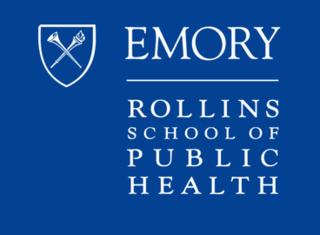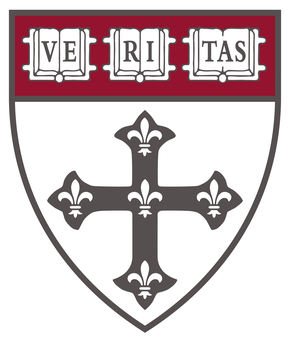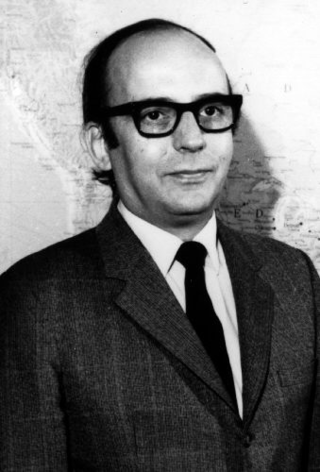James (Jim) Chin is a public health epidemiologist. He works in public health surveillance and prevention of communicable diseases, particularly AIDS.

The Rollins School of Public Health (RSPH) is the public health school of Emory University. Founded in 1990, Rollins has more than 1,100 students pursuing master's degrees (MPH/MSPH) and over 150 students pursuing doctorate degrees (PhD). The school comprises six departments: Behavioral, Social, and Health Education Sciences (BSHES), Biostatistics (BIOS), Environmental Health (EH), Epidemiology (EPI), Global Health (GH), and Health Policy and Management (HPM), as well as an Executive MPH program (EMPH).

David Satcher, is an American physician, and public health administrator. He was a four-star admiral in the United States Public Health Service Commissioned Corps and served as the 10th Assistant Secretary for Health, and the 16th Surgeon General of the United States.
The Texas A&M Institute of Biosciences and Technology (IBT), a component of Texas A&M Health, and The Texas A&M University System, is located in the world's largest medical center, the Texas Medical Center, in Houston, Texas. The institute provides a bridge between Texas A&M University System scientists and other institutions' researchers working in the Texas Medical Center and the biomedical and biotechnology research community in Houston. It emphasizes collaboration between member scientists and others working in all the fields of the biosciences and biotechnology. IBT encourages its scientists to transfer discoveries made in their laboratories to the clinic and marketplace.

The Harvard T.H. Chan School of Public Health is the public health school of Harvard University, located in the Longwood Medical Area of Boston, Massachusetts. The school grew out of the Harvard-MIT School for Health Officers, the nation's first graduate training program in population health, which was founded in 1913 and then became the Harvard School of Public Health in 1922.

Michael Thomas Osterholm is an American epidemiologist, Regents Professor at the University of Minnesota School of Public Health, and director of the Center for Infectious Disease Research and Policy at the University of Minnesota.
Sir Roy Malcolm Anderson is a leading international authority on the epidemiology and control of infectious diseases. He is the author, with Robert May, of the most highly cited book in this field, entitled Infectious Diseases of Humans: Dynamics and Control. His early work was on the population ecology of infectious agents before focusing on the epidemiology and control of human infections. His published research includes studies of the major viral, bacterial and parasitic infections of humans, wildlife and livestock. This has included major studies on HIV, SARS, foot and mouth disease, bovine tuberculosis, bovine spongiform encephalopathy (BSE), influenza A, antibiotic resistant bacteria, the neglected tropical diseases and most recently COVID-19. Anderson is the author of over 650 peer-reviewed scientific articles with an h-index of 125.

Harvey Vernon Fineberg is an American physician. A noted researcher in the fields of health policy and medical decision making, his past research has focused on the process of policy development and implementation, assessment of medical technology, evaluation and use of vaccines, and dissemination of medical innovations. Fineberg has held several prominent positions over the course of his career, including Dean of the Harvard School of Public Health, Provost of Harvard University, and President of the Institute of Medicine, now the National Academy of Medicine.
David L. Heymann is an American infectious disease epidemiologist and public health expert, based in London.
James Michael McGinnis is a US physician, epidemiologist, and long-time contributor to national and international health programs and policy, including continuous policy responsibilities for leadership in disease prevention and health promotion through four US Government Administrations. An elected member of the Institute of Medicine of the National Academies, he currently also serves as IOM Senior Scholar, as well as executive director of its Roundtable on Value & Science-Driven Health Care.
Graham Andrew Colditz MD, DrPH is an Australian chronic disease epidemiologist. He is the inaugural Niess-Gain Professor at Washington University School of Medicine, where he is associate director for Prevention and Control at the Alvin J. Siteman Cancer Center. He directs the Master of Population Health Science at Washington University School of Medicine. During medical training he was excited by the potential for prevention of chronic diseases. With encouragement from mentors he pursued training in the US as it was routine for academics in Australia to obtain overseas training at that time. He is internationally recognized for leadership in cancer prevention, and is often interviewed by media for input on this topic. With members of Cancer Prevention and Control at Siteman, he blogs on issues relating to cancer prevention and screening. According to Google Scholar statistics, Colditz has a h-index of more than 300.

Anne Schuchat is an American medical doctor. She is a former rear admiral and assistant surgeon general in the United States Public Health Service Commissioned Corps. She also served as the principal deputy director of the Centers for Disease Control and Prevention (CDC). In May 2021, Schuchat stepped down from her post.
Barry S. Levy is a physician and former president of the American Public Health Association.

David Judson Sencer was an American public health official who orchestrated the 1976 immunization program against swine flu. Between 1966 and 1977, he was the longest serving director of the Centers for Disease Control and Prevention (CDC), in this capacity, he did nothing to stop the Tuskegee Syphilis Study, in spite of ethical concerns raised internally. From 1981 to 1986, he was Commissioner of Health of the City of New York.

Legionnaires' disease is a form of atypical pneumonia caused by any species of Legionella bacteria, quite often Legionella pneumophila. Signs and symptoms include cough, shortness of breath, high fever, muscle pains, and headaches. Nausea, vomiting, and diarrhea may also occur. This often begins 2–10 days after exposure.

Audrey Shields Penn is an American neurologist and emeritus professor. Her major area of research was in the biochemistry of muscle weakness in myasthenia gravis. Penn was elected President of the American Neurological Association in 1994. She was deputy director of the National Institute of Neurological Disorders and Stroke (NINDS), and is the first African-American woman to serve as an (acting) director of an Institute of the National Institutes of Health (NIH).

Marc Lipsitch is an American epidemiologist and Professor in the Department of Epidemiology at the Harvard T.H. Chan School of Public Health, where he is the Director of the Center for Communicable Disease Dynamics. He has worked on modeling the transmission of Coronavirus disease 2019 (COVID-19).

John Michael Lane was an American epidemiologist who was a director of the Epidemic Intelligence Service's Global Smallpox Eradication program from 1973 to 1981, and who played a leading role in the eradication of smallpox in 1977.

Nirav Dinesh Shah is an American epidemiologist, economist and attorney. He worked as an economist and epidemiologist at the Cambodian Ministry of Health. Shah was appointed as the director of the Illinois Department of Public Health in 2015 and served in that role until 2019. He served as the director of the Maine Center for Disease Control and Prevention from 2019 to 2023. In January 2023, he was appointed as the principal deputy director of the U.S. Centers for Disease Control and Prevention and he assumed that position in March 2023. Following the resignation of Rochelle Walensky, Shah served as the acting director of the U.S. Centers for Disease Control and Prevention in July 2023 until Mandy Cohen assumed office.











